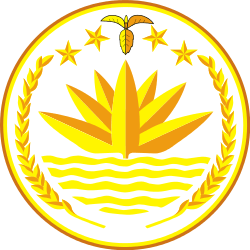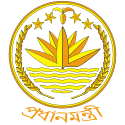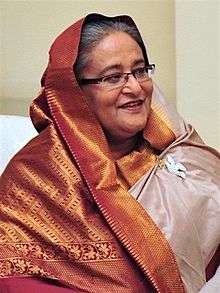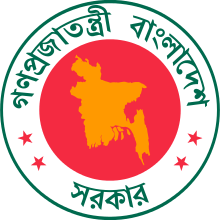Prime Minister of Bangladesh
| Prime Minister of the People's Republic of Bangladesh
গণপ্রজাতন্ত্রী বাংলাদেশের প্রধানমন্ত্রী | |
|---|---|
|
Prime ministerial emblem | |
|
Prime ministerial standard | |
| Style | The Honourable |
| Member of | |
| Residence | Gonobhaban, Dhaka |
| Seat | Prime Minister's Office, Tejgaon, Dhaka |
| Appointer | President of Bangladesh |
| Term length | The prime minister is by convention the leader of the victorious party. No term limits are imposed on the office. |
| Inaugural holder | Tajuddin Ahmed |
| Formation | 26 March 1971 |
| Website |
pmo |
 |
| This article is part of a series on the politics and government of Bangladesh |
|
Constitution |
|
Executive |
|
|
Political parties |
|
Foreign policy |
The Prime Minister of the People's Republic of Bangladesh (Bengali: বাংলাদেশের প্রধানমন্ত্রী — Bangladesher Prôdhan'môntri) is the Head of the Government of Bangladesh. The Prime Minister and the Cabinet are collectively accountable for their policies and actions to the Parliament, to their political party and ultimately to the electorate. The current Prime Minister, Sheikh Hasina Wajed, were appointed on 6 January 2009 by the President of Bangladesh.
Appointment of the Prime Minister
According to the Constitution the Prime Minister is appointed by the President based upon the result of the electorates choice in parliamentary general election held by the Election Commission. The Prime Minister will be the leader of the majority party (or coalition) in the Jatiya Sangsad and must have the confidence of the Jatiya Sangsad to govern. The cabinet is composed of ministers selected by the prime minister and appointed by the president. At least 90% of the ministers must be MPs. The other 10% may be non-MP experts or "technocrats" who are not otherwise disqualified from being elected MPs. According to the constitution, the president can dissolve Parliament upon the written request of the prime minister.
Duties of the office
The office of the Prime Minister is located at Tejgaon in Dhaka city. It is considered a ministry of the government and among other duties, provides clerical, security, and other support to the prime minister, governs intelligence affairs, NGOs, and arranges protocol and ceremonies.
Change of government
In September 1991, the electorate approved changes to the constitution, formally creating a parliamentary system and returning governing power to the office of the prime minister, as in Bangladesh's original constitution. In October 1991, members of parliament elected a new head of state, President Abdur Rahman Biswas.[1]
History
Khaleda Zia (BNP)
Khaleda Zia served as Prime Minister of Bangladesh three times, since 1991. Once in power, Khaleda Zia's government made substantial changes in education policy, introducing free education for girls up to the 10th grade, a stipend for female students, and food for education programme funds. It also made highest budgetary allocation in the education sector.
She became Prime Minister for the second consecutive term after the BNP had a landslide victory in the 15 February 1996 general election to the sixth Jatiya Sangsad which is widely believed to be rigged voting after buying the election commissioner for 1bdt. The election was, however, boycotted by all other major parties who were demanding that the elections be held under a neutral caretaker government, following allegations of rigging in a by-election held in 1994. Turnout was estimated at around 5%, though the government at the time claimed it to be much higher. In the 12 June 1996 polls, BNP lost to Sheikh Hasina's Awami League but emerged as the largest opposition party in the country's parliamentary history with 116 seats.
Aiming to return to power, the BNP formed a four-party alliance on 6 January 1999 with its former political opinion Jatiya Party, and the Islamic party of Jamaat-e-Islami Bangladesh and the Islami Oikya Jot and launched several agitation programmes against the ruling Awami League. In the 2001 general elections BNP won the election with a two-third majority of seats in parliament and 46% of the vote (compared to the principal opposition party's 40%) and Khaleda Zia was once again sworn in as the Prime Minister of Bangladesh.
In 2008 election, they faced a landslide defeat. Khaleda led four-party alliance won only 32 seats and emerged as the smallest opposition party in the country's parliamentary history. They won only 32% of the total vote where their main rival Awami League won more than 50% of the total vote.
In the Tenth Jatiyo Sangsad election of 2014, the BNP along with its 18 party alliance boycotted and violently protested the election to no avail.
Sheikh Hasina (Awami League)
Sheikh Hasina lost to Khaleda Zia in 1991 parliamentary election after managing to win 88 seats and her party sat in opposition benches. She boycotted the 1996 February 15 elections giving Khaleda Zia a default victory.
Awami League won 146 seats in the 1996 June 12 parliamentary elections. The support of the Jatiya Party and a few independent candidates were enough for the 150 or more seats needed for the required majority. Sheikh Hasina took the oath as the prime minister of Bangladesh. She vowed to create a Government of National Unity. Though some smaller parties and a few individuals from BNP did join the government, the distance between the main two political parties as well as their leaders remained as large as ever.
Awami League was defeated in the 2001 Parliament election. It won only 62 seats in the Parliament, while the Four-Party Alliance led by the Bangladesh Nationalist Party won more than 200 seats, giving them a two-third majority in the Parliament. Sheikh Hasina herself was defeated from a constituency in Rangpur, which happened to contain her husband's hometown, but won from three other seats. Sheikh Hasina and the Awami League rejected the results, claiming that the election was rigged with the help of the President and the Caretaker government. However, the international community was largely satisfied with the elections and the Four-Party Alliance went on to form the government.
In the December 2008 election, Sheikh Hasina's Awami league got a landslide victory winning 230 seats, which gave them the two-thirds majority in the parliament. She made an alliance with JP and left fronts and her grand alliance won 252 seats in the parliament. Sheikh Hasina took oath as Prime Minister on 6 January 2009. She is still the prime minister of Bangladesh after winning a walkover 5 January 2014 election when Khaleda Zia's BNP boycotted the general election.
Political crisis
The scheduled 22 January 2007 elections were marred by controversy. The Awami League and its allies protested, saying that the elections would not be fair because of alleged bias by the caretaker government in favor of Khaleda Zia and the BNP. Hasina demanded that the head of the caretaker government, President Iajuddin Ahmed, step down from that position, and on 3 January 2007, she announced that the Awami League and its allies would boycott the elections.[2] Later in the month, the military led by Army Chief General Moinuddin Ahmed intervened and President Iajuddin Ahmed was asked to resign as the Chief Advisor. He was also made to declare a state of emergency. A new military-controlled Caretaker government was formed with Dr. Fakhruddin Ahmed as the Chief Adviser. The scheduled parliamentary election was postponed.
2007 interim caretaker government
On 12 January 2007, President Iajuddin Ahmed swore in Fakhruddin Ahmed as the Chief Adviser to the Interim Caretaker Government. For a country widely perceived as one of the world's most corrupt, the most dramatic aspect of Fakhruddin Ahmed's rule is his antigraft campaign against the establishment. So far, more than 160 senior politicians, top civil servants and security officials have been arrested on suspicion of graft and other economic crimes.[3] The roundup has netted former ministers from the two main political parties, including former prime ministers Khaleda Zia and Sheikh Hasina and former adviser Fazlul Haque.
List of Prime Ministers
See also
- President of Bangladesh
- Prime Minister of Bengal
- Foreign Minister of Bangladesh
- Caretaker government
- Politics of Bangladesh
- Constitution of Bangladesh
References
- ↑ "Background Note: Bangladesh". US Department of State. 15 December 1992. Retrieved 2008-04-05.
- ↑ Habib, Haroon (4 January 2007). "Polls won't be fair: Hasina". The Hindu.
- ↑ Abdullah, Abir (22 March 2007). "Corruption has emerged as a great threat". Time.



